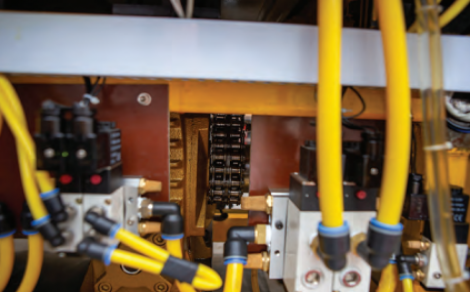Emerging trends in electro-pneumatic systems

H&P looks at the emerging trends of electro-pneumatics, exploring how integration with IoT, energy efficiency, advanced control, miniaturisation, safety enhancements, and AR training are shaping the future of industrial automation.
Electro-pneumatic systems have long been the backbone of countless manufacturing processes. Combining the precision of electronics with the power and reliability of pneumatic actuators, these systems have enabled unprecedented levels of efficiency and control in diverse industries ranging from automotive to food processing. However, as technology advances and demands evolve, new trends are shaping the landscape of electro-pneumatics, promising even greater capabilities and efficiencies. Below are some of these key trends:
Integration with IoT and Industry 4.0
One of the most significant trends in electro-pneumatic systems is their integration with the Internet of Things (IoT) and the principles of Industry 4.0. By connecting pneumatic components to a network and leveraging data analytics, manufacturers can achieve real-time monitoring and predictive maintenance, minimizing downtime and optimizing performance. This integration enables proactive decision-making based on insights derived from sensor data, leading to enhanced productivity and cost savings.
Energy efficiency and sustainability
With growing concerns about energy consumption and environmental impact, there is a rising emphasis on energy-efficient solutions in electro-pneumatics. Manufacturers are developing innovative pneumatic components and systems designed to minimise air consumption while maintaining high performance. Additionally, the use of regenerative technologies, such as energy recovery systems, allows for the reuse of energy that would otherwise be wasted, further reducing the carbon footprint of industrial operations.
Advanced control and precision
As demands for precision and flexibility increase, electro-pneumatic systems are incorporating advanced control technologies to achieve higher levels of accuracy and responsiveness. Proportional valves, servo-pneumatic systems, and closed-loop control mechanisms enable precise regulation of pressure, flow, and position, allowing for fine-tuning of processes and improved product quality. This trend is particularly evident in applications requiring complex motion control, such as robotics and packaging machinery.
Miniaturisation and Modularisation
With the ongoing trend towards miniaturisation and modularisation in industrial automation, electro-pneumatic systems are becoming more compact, lightweight, and flexible. Miniature valves, actuators, and manifolds enable the creation of space-saving solutions for tight installation environments, while modular components facilitate rapid system integration and scalability. This trend not only reduces equipment footprint but also simplifies maintenance and upgrades, enhancing overall system agility and cost-effectiveness.
Enhanced safety and compliance
In an era of stringent safety regulations and industry standards, electro-pneumatic systems are evolving to ensure compliance and mitigate risks in hazardous environments. Safety-rated components, such as redundant valves and pressure sensors, are being integrated into systems to provide fail-safe operation and prevent potential accidents. Moreover, advancements in diagnostic capabilities enable early detection of faults and deviations, enhancing overall system reliability and operator safety.
Augmented reality and training
As the workforce undergoes digital transformation, there is a growing need for advanced training and support tools in electro-pneumatics. Augmented reality (AR) technologies are being employed to provide interactive training experiences, allowing operators to visualise and simulate complex pneumatic systems in real-time. This approach enhances learning effectiveness and reduces training time, empowering personnel to troubleshoot issues and optimise system performance more efficiently.
The field of electro-pneumatics is witnessing a transformative period driven by technological innovation and evolving industrial requirements. From IoT integration to energy efficiency and advanced control, these trends are reshaping the capabilities and possibilities of pneumatic automation systems. By embracing these developments, manufacturers can stay ahead of the curve, unlocking new levels of productivity, sustainability, and competitiveness in the dynamic landscape of industrial automation.
-
PPMA 2025
23 September, 2025, 9:30 - 25 September, 2025, 16:00
NEC, Birmingham UK -
Advanced Engineering Show 2025
29 October, 2025, 9:00 - 30 October, 2025, 16:00
NEC, Birmingham UK










